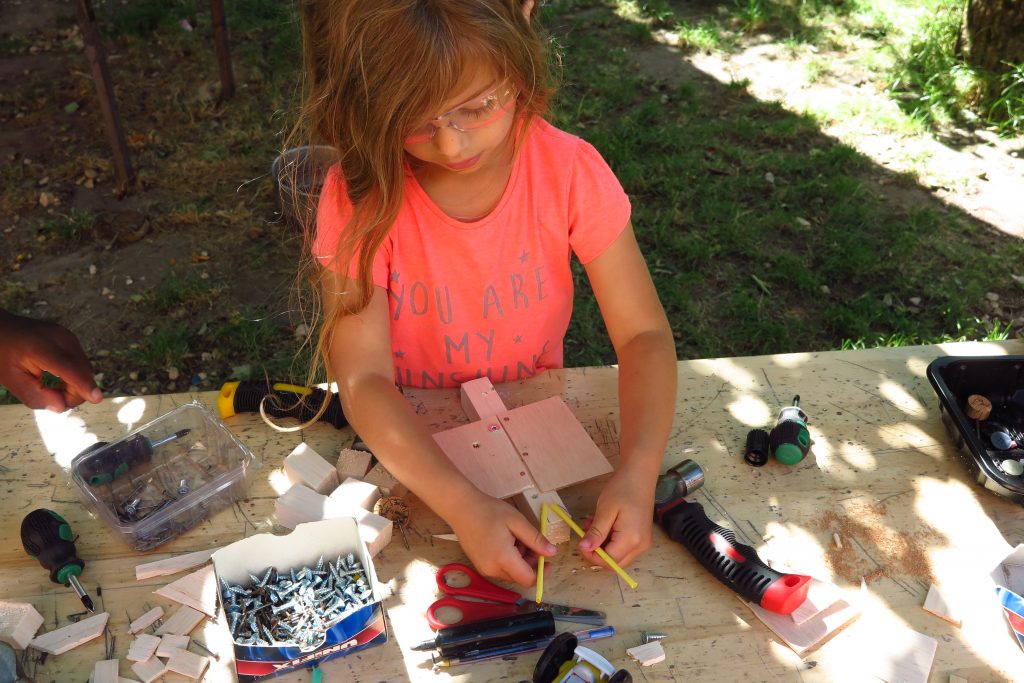
Specific areas of learning and development provide children with knowledge and skills to flourish in society.
The Specific areas, Literacy, Mathematics, Understanding the world, and Expressive arts and design, are not time-sensitive in terms of the brain’s biological responsiveness to experiences. The Specific areas represent crucial shared cultural tools and knowledge, which babies and children engage in as members of the society in which they live.
Many aspects of these areas arise naturally for young children as they make sense of their experiences, such as an awareness of quantity, enjoyment of telling and hearing stories, finding out how things work, rhythm, and movement. Children often begin to represent what they understand with their own actions, marks or words. There are also ways of representing understanding with more formal symbol systems such as numbers, writing and other cultural tools and methods for sharing and recording ideas, as well as large bodies of knowledge to be shared with children.
As adults gradually support children to know about and use these Specific areas, either informally as part of daily life or in planned activities, they give children access to the wide scope of shared cultural and intellectual life in modern society, and skills and knowledge to support them in their future learning.
Expressive Arts and Design
Children and adults have the right to participate in arts and culture. Expression conveys both thinking (ideas) and feeling (emotion). Children use a variety of ways to express and communicate, through music, movement and a wide range of materials. Creative thinking involves original responses, not just copying or imitating existing artworks.
Expressive Arts and Design fosters imagination, curiosity, creativity, cognition, critical thinking and experimentation and provides opportunities to improvise, collaborate, interact and engage in sustained shared thinking. It requires time, space and opportunities to re-visit and reflect on experiences. Multi-sensory, first-hand experiences help children to connect and enquire about the world. Appreciating diversity and multiple perspectives enriches ways of thinking, being, and understanding. Skills are learned in the process of meaning-making, not in isolation.
Understanding the World
Understanding the World provides a powerful, meaningful context for learning across the curriculum. It supports children to make sense of their expanding world and their place within it through nurturing their wonder, curiosity, agency and exploratory drive.
This development requires regular and direct contact with the natural, built and virtual environments around the child and engaging children in collaborative activities which promote inquiry, problem-solving, shared decision making and scientific approaches to understanding the world. Active involvement in local community life helps children to develop a sense of civic responsibility, a duty to care, a respect for diversity and the need to work for peaceful co-existence.
In addition, first-hand involvement in caring for wildlife and the natural world provides children with an appreciation of ecological balance, environmental care and the need to live sustainable lives. Rich play, virtual and real world experiences support learning about our culturally, socially, technologically and ecologically diverse world and how to stay safe within it. They also cultivate shared meanings and lay the foundation for equitable understandings of our interconnectedness and interdependence.
Literacy
Literacy is about understanding and being understood. Early literacy skills are rooted in children’s enjoyable experiences from birth of gesturing, talking, singing, playing, reading and writing. Learning about literacy means developing the ability to interpret, create and communicate meaning through writing and reading in different media, such as picture books, logos, environmental print and digital technologies. It involves observing and joining in the diverse ways that different people and communities use literacy for different purposes. Most importantly, literacy is engaging, purposeful and creative.
Developing literacy competence and skills is a complex, challenging yet rewarding journey that requires high-quality pedagogical activities to enhance learning. Young children need to be listened to by attentive adults who recognise and value children’s choices. They need enjoyable, playful opportunities of being included and involved in the literacy practices of their home, early years setting, and community environments. They need experiences of creating and sharing a range of texts in a variety of ways, with different media and materials, with adults and peers, both indoors and outdoors, as well as learning about using different signs and symbols, exploring sound and developing alphabetic and phonetic skills.
Mathematics
Mathematics for young children involves developing their own understanding of number, quantity, shape and space. Babies and young children have a natural interest in quantities and spatial relations – they are problem-solvers, pattern-spotters and sense-makers from birth. This curiosity and enjoyment should be nurtured through their interactions with people and the world around them, drawing on their personal and cultural knowledge. Every young child is entitled to a strong mathematical foundation which is built through playful exploration, apprenticeship and meaning-making. Children should freely explore how they represent their mathematical thinking through gesture, talk, manipulation of objects and their graphical signs and representations, supported by access to graphic tools in their pretend play.
Effective early mathematics experiences involve seeking patterns, creating and solving mathematical problems and engaging with stories, songs, games, practical activities and imaginative play. Plenty of time is required for children to revisit, develop and make sense for themselves. This is supported by sensitive interactions with adults who observe, listen to and value children’s mathematical ideas and build upon children’s interests, including those developed with their families. It is crucial to maintain children’s enthusiasm so they develop positive self-esteem as learners of mathematics and feel confident to express their ideas.
Previous page: Prime Areas | Next page: Holistic development and learning
